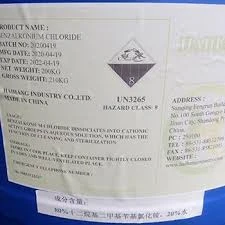Applications of Poly Aluminium Chloride in Water Treatment Processes
The Use of Poly Aluminium Chloride in Water Treatment
Water is a vital resource for life, and maintaining its quality is essential for public health and the environment. One of the most effective chemical coagulants used in water treatment processes is Poly Aluminium Chloride (PAC). This substance has gained popularity due to its efficiency, versatility, and ability to improve the overall quality of treated water. In this article, we will explore the uses of PAC in water treatment and the benefits it brings to this crucial process.
What is Poly Aluminium Chloride?
Poly Aluminium Chloride is a water-soluble inorganic polymer that consists of aluminum hydroxide and aluminum chloride. This compound is produced through the hydrolysis of aluminum chloride in a controlled environment. It is available in both solid and liquid forms and is commonly used in municipal water treatment plants, industrial water treatment systems, and wastewater treatment facilities.
Mechanism of Action
The primary function of PAC in water treatment is coagulation. It works by neutralizing the charges on suspended particles in water, causing them to clump together into larger aggregates called flocs. This process facilitates the settling of these particles, which can then be easily removed from the water during subsequent filtration stages. PAC is effective at removing a variety of contaminants, including silt, algae, organic matter, and microorganisms.
Benefits of Using PAC
1. Higher Efficiency One of the key advantages of PAC over traditional coagulants like alum (aluminum sulfate) is its superior efficiency. PAC can achieve optimum coagulation at lower doses and under a wider pH range. This versatility allows water treatment facilities to optimize their chemical usage, leading to cost savings and reduced chemical exposure.
2. Better Quality of Treated Water PAC not only enhances the removal of turbidity but also effectively eliminates color and odors from water. The improved coagulation process translates into higher quality water that meets or exceeds regulatory standards for drinking water.
poly aluminium chloride uses in water treatment

3. Reduced Sludge Volume The polymeric nature of PAC leads to the formation of denser and more compact flocs. As a result, the volume of sludge generated during the treatment process is significantly reduced. This not only minimizes disposal costs but also makes the dewatering process more efficient.
4. Lower Toxicity Unlike some other coagulants, PAC has a lower environmental impact and is considered less toxic. It poses less harm to aquatic life and is safer for use in drinking water treatment. This aspect is particularly important in ensuring sustainable water treatment practices.
5. Compatibility PAC can be effectively used with a variety of other treatment chemicals and processes, including softening agents and disinfectants. This compatibility makes it easier for water treatment plants to incorporate PAC into their existing treatment frameworks.
Application in Various Water Treatment Processes
Poly Aluminium Chloride is widely utilized in various stages of water treatment. From sedimentation and filtration to disinfection, PAC plays a crucial role in enhancing the overall effectiveness of water quality management. In municipal wastewater treatment, PAC helps in removing suspended solids, pathogens, and other contaminants, ensuring that the effluent discharged back into the environment is safe and clean.
Additionally, PAC is also employed in treating industrial wastewater, where it assists in removing heavy metals and other pollutants before the water is returned to natural bodies of water or reused in industrial processes.
Conclusion
The use of Poly Aluminium Chloride in water treatment is an essential advancement in ensuring the provision of safe, clean, and high-quality water. Its efficiency, reduced environmental impact, and ability to work across a wide range of conditions make it a preferred choice for water treatment facilities worldwide. As we continue to face challenges such as population growth and climate change, the importance of effective water treatment solutions like PAC cannot be overstated. Investments in these technologies are crucial for sustainable water management and the protection of public health.
-
Water Treatment with Flocculant Water TreatmentNewsJun.12,2025
-
Polymaleic AnhydrideNewsJun.12,2025
-
Polyaspartic AcidNewsJun.12,2025
-
Enhance Industrial Processes with IsothiazolinonesNewsJun.12,2025
-
Enhance Industrial Processes with PBTCA SolutionsNewsJun.12,2025
-
Dodecyldimethylbenzylammonium Chloride SolutionsNewsJun.12,2025





